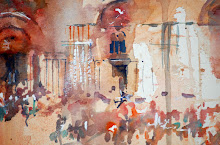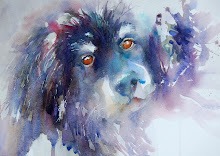What is Watercolour?
What is Watercolour?
What exactly is watercolour? I am constantly asked questions about the medium I adore and find the discussions that often follow absolutely fascinating. In fact there are now so many products on the market that are classed as "watercolour" that I can understand the confusion and the need to look into what this medium really is.
Formulations
Watercolours are created by mixing pigment with water. But what exactly can be classed as watercolour? Anything you add water to? That does seem to be the modern consensus and way of thinking which is why manufacturers have fun creating a vast number of products with additions to the formulation to make the artist who wishes to work in this mediums life far easier.
Natural Pigment
I studied watercolour in Asia where my mentor used to ask me to create my own colour by grinding natural stones and then mixing them with water to create the most magical of shades.This was time consuming for a young artist who was eager to paint! This was the way years ago artists created their work and the results were incredible. Patience was needed but the rewards were high.
Now we simply order online or buy in a shop and we are ready to paint with colour instantly at hand. But what are we using compared to our ancestors?
Changing History
Over the years as man learned that watercolour was difficult to handle they typically looked for an easier option rather than enjoy the already existing beauty. Other ingredients were added to the natural pigments for a vast number of reasons. To improve the granulation, slow down or speed up the flow or even speed up the drying process on paper which can then make the water colour products easier to control.
Water Based Products
Whichever way you look at it by changing the formulation to make the artists life easier is affecting the purity of the medium and results when using it. Which is why I don't see acrylics as watercolour or water based oils. I see these products as an easier alternative to learning how to use a beautiful medium that creates astonishing results in its own right.
Watercolour Versus Water Colour
I admire the artist that paints in pure transparent watercolour and gains the insight into how the medium works. I admire artists who work in all mediums but wish there was a clear definition into what watercolour really is. Can it honestly simply be a product manufactured to be mixed with water and then claim the name? I don't think so. Acrylics are acrylics, it's as simple as that!
This week has been so interesting and I have loved many conversations in it. One that made me laugh was that we add water to orange squash so if we painted with it the result could be interesting. Would that make it " watercolour"?. Anything that stains paper when water is added could be classed as "water colour" .
Only One Watercolour!
But for me there is only one product that genuinely can be classed as "watercolour". It comes in tubes or pans and on the product this word will be seen very clearly. It won't be defined as acrylic or any other description. It will be magical and admired for what it is and can do in the right hands.
"Watercolour" is watercolour.
Watercolour working on paper as only watercolour can!
And I love it!


























1 comment:
Hello Jean. I entirely agree with what you are saying here. You simply cannot beat pure original watercolour painting!
Bazza’s Blog ‘To Discover Ice’
Post a Comment